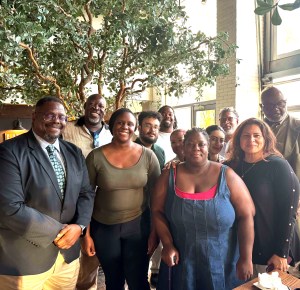Norfolk State University and University of Michigan Launch Groundbreaking Partnership to Expand Access to Training in Quantitative Research
By ...

NORFOLK, Va. – In today’s data-driven world, proficiency in quantitative methods is vital across disciplines. Yet, access to high-quality training has never been evenly distributed. To address this unevenness, Norfolk State University (NSU), the largest public HBCU (Historically Black Colleges and Universities) in Virginia, has joined forces with the University of Michigan’s Inter-university Consortium for Political and Social Research (ICPSR) Summer Program in Quantitative Methods to expand access to advanced training in quantitative research for NSU students and faculty.
This new partnership brings the ICPSR Summer Program’s world-class training in statistical and data analysis directly to the NSU campus. Through a series of online modules and in-person workshops, the “stats bootcamp” aims to strengthen the preparation of student participants for careers and graduate studies in data-driven fields. The in-person workshops are conducted by ICPSR faculty alongside NSU faculty and are tailored to meet NSU students wherever they may be in their academic journey.
The partnership was built through the efforts of Dr. Tyson King-Meadows, Dean of the NSU College of Liberal Arts, Sandy Zalmout, Business Development Director for the ICPSR Summer Program, and Rob Franzese, Director of the ICPSR Summer Program. All three are very familiar with the challenges students face, especially in underrepresented communities, in gaining access to high-quality training in quantitative methods. Their commitment and work in quantitative methods training, higher education, and educational-programming administration has spurred their passion to create opportunities for increased access to training through the ICPSR Summer Program. The partnership brings unparalleled resources and expertise directly to Norfolk State University’s students and faculty.
Expanding Access Through Tailored Training
“Central to this partnership are tailored, in-person workshops that overcome exclusionary barriers and meet NSU students where they are in their academic journey and at their home institution,” said Zalmout. By extending access and opportunities, this partnership also “enriches both the learning environment and the broader intellectual dialogue among participants and increases access to critical training and research materials,” explained Zalmout. “This partnership connects NSU students to one of the most respected quantitative training programs in the country while keeping them rooted in their home institution,” said King-Meadows.
The partnership encompasses more than just a training opportunity. It also renewed NSU’s membership in the Consortium, which will enable NSU faculty and students to access survey data and other data housed in the Consortium’s data repository. As such, the partnership is a step toward strengthening the research capacity and infrastructure that will help NSU advance from its current Carnegie classification to a higher level of research activity (R2 status). With expertise, resources, and national networks from the University of Michigan, this collaboration strengthens NSU’s ability to compete for major research grants, foster faculty development, and prepare students for high-demand roles in technology, data science, public policy, and other quantitative fields.
Interest in the program has been extremely strong, with more than 380 applications received and 99 students accepted, 77 undergraduates and 22 graduate students, representing a diverse cross-section of NSU’s academic programs. These students will gain skills in statistical software, data visualization, research design, and statistical analysis, positioning them for success in graduate school and the job market. With this new partnership, NSU is not only enriching the educational experience for its students but also laying the groundwork for long-term institutional growth, greater research competitiveness, and expanded career pathways for graduates.
Broadening the Impact of Inclusive Research
For over 60 years, the ICPSR Summer Program, based at the University of Michigan, has trained thousands of researchers from around the world in cutting-edge quantitative methods. Bringing its expertise to NSU reflects the shared commitment between the ICPSR Summer Program and NSU to broaden access to high-quality research training for historically underrepresented communities. “This new endeavor between NSU and ICPSR is providing high-caliber, culturally competent training, expanding educational opportunities, and empowering a new generation of scholars who will drive innovation in quantitative research for years to come,” remarked Zalmout, who has been working diligently to ensure that the Summer Program remains a vibrant community devoted to advancing quantitative-research methodologies and promoting inclusivity.
Dean King-Meadows, a 2012 alum of the eight-week ICPSR Summer Program and of some of its other training workshops, commends the enduring commitment of the Program to inclusivity and applauds the leadership of Zalmout and Franzese for helping bring the partnership to fruition. “This partnership represents much more than an investment in the future of NSU students and in the University’s upward trajectory,” said King-Meadows. “It is an investment in the future of scientific inquiry.”
Related: Summer Training Partnership Delivers Measurable Impact After First Year